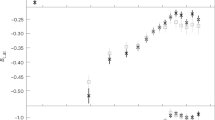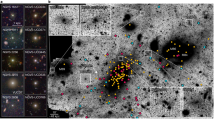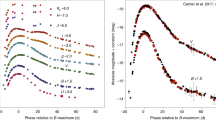Abstract
The spectrum of the irregular variable ρ Cassiopeiæ has been variously classified as G7 (Victoria), cG0 (Mt. Wilson), F8p (Yerkes) and F8p (Harvard), the last classification being accompanied by the note “the spectrum resembles class K0 in the region of Hβ” The classifications agree in attributing the spectrum to a supergiant with a luminosity about 1,500 times that of the sun, while the surface temperature varies irregularly in periods of the order of 200—1,000 days, about an average not far from the solar value of 6,000° K.
This is a preview of subscription content, access via your institution
Access options
Subscribe to this journal
Receive 51 print issues and online access
$199.00 per year
only $3.90 per issue
Buy this article
- Purchase on Springer Link
- Instant access to full article PDF
Prices may be subject to local taxes which are calculated during checkout
Similar content being viewed by others
References
Harvard Announcement Card, 752 (June 11, 1946).
"Moleculspektren", 1, 35 (Springer, 1935).
Ladenburg, R., Phys. Z., 30, 369 (1929).
ter Haar, D., Bull. Ast. Inst. Netherlands, No. 361 (1943); Mon. Not. Roy. Ast. Soc., 106 (1946).
Author information
Authors and Affiliations
Rights and permissions
About this article
Cite this article
THACKERAY, A. Spectrum of ρ Cassiopeiæ. Nature 160, 370–371 (1947). https://doi.org/10.1038/160370b0
Issue Date:
DOI: https://doi.org/10.1038/160370b0
Comments
By submitting a comment you agree to abide by our Terms and Community Guidelines. If you find something abusive or that does not comply with our terms or guidelines please flag it as inappropriate.



